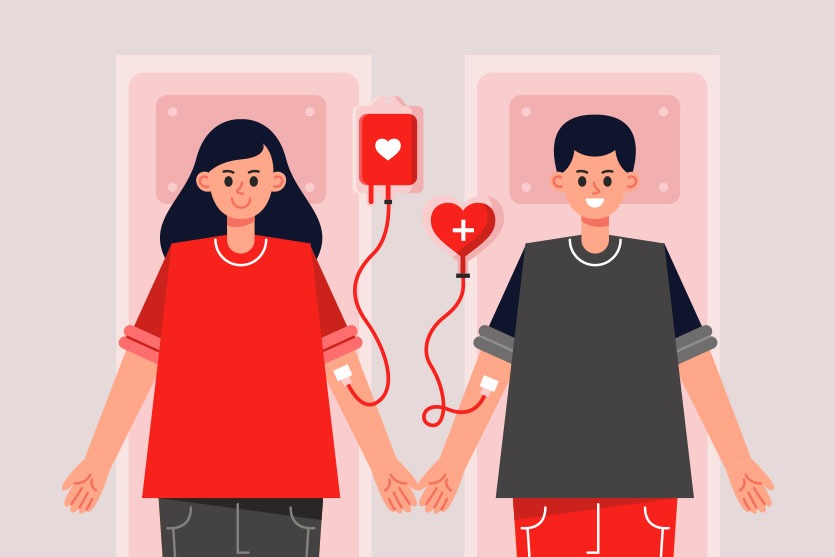
Encouraging Blood Donation Culture: How Individuals Can Contribute to Building a Sustainable Blood Supply?
Introduction:
The culture of blood donation stands as one of the most crucial humanitarian practices, forming a fundamental pillar in supporting community well-being and health.
Donating blood is not merely a humanitarian act; it constitutes a cornerstone in healthcare support and lifesaving endeavors.
Blood donation processes enhance the ability to treat various critical medical conditions and play a vital role in emergencies, surgeries, and accidents.
Sustaining a stable blood supply necessitates extensive collaboration among individuals, healthcare institutions, and communities.
This requires fostering a culture of donation, raising awareness about its significance, and highlighting its positive impact on others’ lives.
Diligent efforts to encourage blood donation reflect noble human spirit and commitment to social responsibility.
Those who offer their blood become an integral part of supporting continuous and essential medical treatments for patients.
This generous contribution holds within it hope and life for those in need of this support.
Despite the significance of blood donation, challenges hinder the widespread adoption of its culture, including shortages in supply and lack of awareness about its importance.
Thus, promoting and raising awareness about the importance of donation is not just an individual action but a collective endeavor that requires continuous support and encouragement from healthcare institutions and local communities.
This article aims to explore how individuals can contribute to building a sustainable blood supply, shedding light on methods and actions that can stimulate the culture of donation and enhance blood availability to meet ongoing medical needs.
Achieving a Sustainable Blood Supply:
Individuals can contribute to building a sustainable blood supply by donating regularly, encouraging others, participating in donation campaigns and educational activities, adhering to health guidelines, and taking care of their personal health. These steps constitute a fundamental part of efforts to maintain a reliable blood supply that can meet continuous healthcare needs.
- Regular Blood Donation:
Regular blood donation significantly contributes to building a sustainable blood supply. Individuals capable of donating should do so regularly within the permissible intervals according to medical guidelines and regulations. - Encouraging Others to Donate:
Individuals play a significant role in increasing the number of donors by encouraging friends, family, and acquaintances to join and donate blood, contributing to expanding the donor base. - Participation in Donation Campaigns:
Active participation in blood donation campaigns organized by hospitals, healthcare centers, and humanitarian associations allows individuals to effectively contribute. By engaging in these campaigns, individuals can motivate others to participate as well. - Adherence to Appointment and Medical Instructions:
It’s crucial for individuals to adhere to scheduled donation appointments and follow health instructions provided by relevant authorities. This contributes to sustaining the donation process and the quality of donated blood. - Focus on Public Health:
Maintaining a healthy lifestyle plays a significant role in a person’s ability to donate blood. Individuals can focus on consuming nutritious food, engaging in physical exercise, and maintaining adequate iron and hemoglobin levels in the body to ensure their ability to donate. - Engagement in Awareness Campaigns:
Raising awareness about the importance of blood donation plays a crucial role in increasing collective awareness. Individuals can contribute to this aspect by participating in educational campaigns, spreading awareness about the benefits of blood donation, and its significance. - Volunteering at Donation Centers:
Some centers rely on volunteers to assist in organizing blood donation processes. Individuals can contribute by volunteering at these centers, assisting in receiving donors, and providing logistical and administrative support. - Continuous Support and Encouragement:
Providing support and encouragement to donors and potential donors can significantly contribute to enhancing the donation culture and increasing the number of donors.
1.Health Benefits for Donors:
- Improvement of General Health: Some suggest that blood donation contributes to improving donors’ health by reducing the risk of heart diseases and increasing red blood cell production.
- Regeneration of Blood Cells: After donation, the body regenerates lost blood, stimulating the production of new blood cells.
2.Humanitarian and Social Impact:
- Lifesaving: Blood donation contributes to saving lives, especially in emergencies, accidents, and treating conditions like anemia and other blood-related diseases.
- Supporting the Community: Fostering a culture of donation enhances human spirit and embodies commitment to supporting the community and others.
3.Impact on Medical Treatment:
- Reliance on Sustainable Blood Supply: Having a sustainable blood supply ensures blood availability for emergencies, surgeries, childbirth, and other critical medical conditions.
- Providing Necessary Treatment: A sustainable blood supply facilitates the immediate and effective provision of necessary treatment to patients.
4.Economic Impact:
- Saving on Medical Expenses: Blood donation reduces the need for imported blood, thereby decreasing medical expenses.
- Enhancing Productivity: Providing medical treatments faster contributes to patients returning to work swiftly, enhancing economic productivity.
5.Voluntary Donation Effect:
- Blood Quality: Some suggest that voluntarily donated blood is of higher quality and safety, leading to improved treatment outcomes.
- Sense of Participation: Donors experience satisfaction and happiness in contributing to supporting others and saving lives.
Donating blood has a major impact on public health and society as a whole. In addition to saving life, blood donation shows health benefits for donors and affects medical treatment and the economy positively. Encouraging individuals to participate in this humanitarian work enhances the sustainable need for reliable blood stocks.
Conclusion:
In conclusion, the significance of blood donation and the vital role donors play in supporting various critical medical conditions must be comprehended by all. Through our collective efforts in awareness, encouraging regular donation, and providing support and assistance to donors, we can build a sustainable blood supply and ensure blood availability in both emergency and routine situations.









Ivy4716
April 23, 2025Very good https://shorturl.at/2breu
Gemma1392
April 26, 2025Awesome https://t.ly/tndaA
Israel3043
April 27, 2025Good https://urlr.me/zH3wE5
Jay2023
April 28, 2025Awesome https://rb.gy/4gq2o4
Alexander2340
April 28, 2025Very good https://is.gd/N1ikS2
Francis2761
April 30, 2025Very good https://is.gd/N1ikS2
Edgar3888
May 1, 2025Very good https://is.gd/N1ikS2